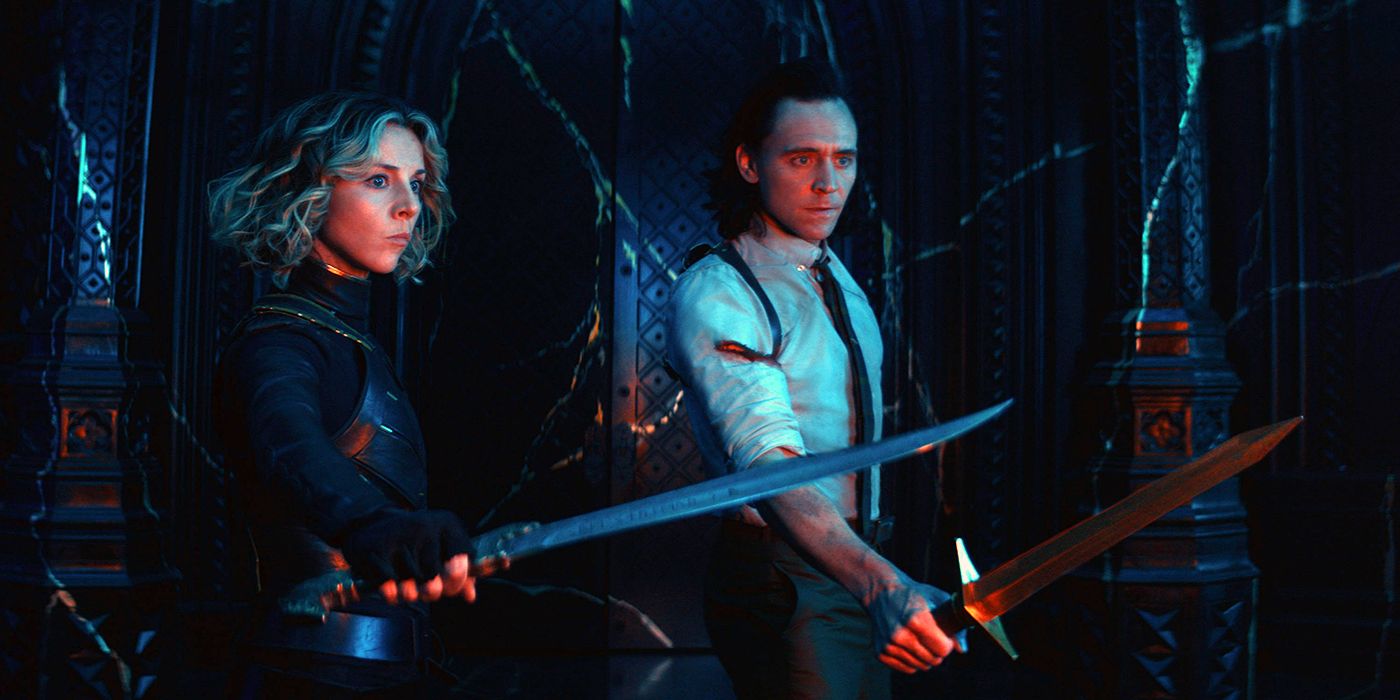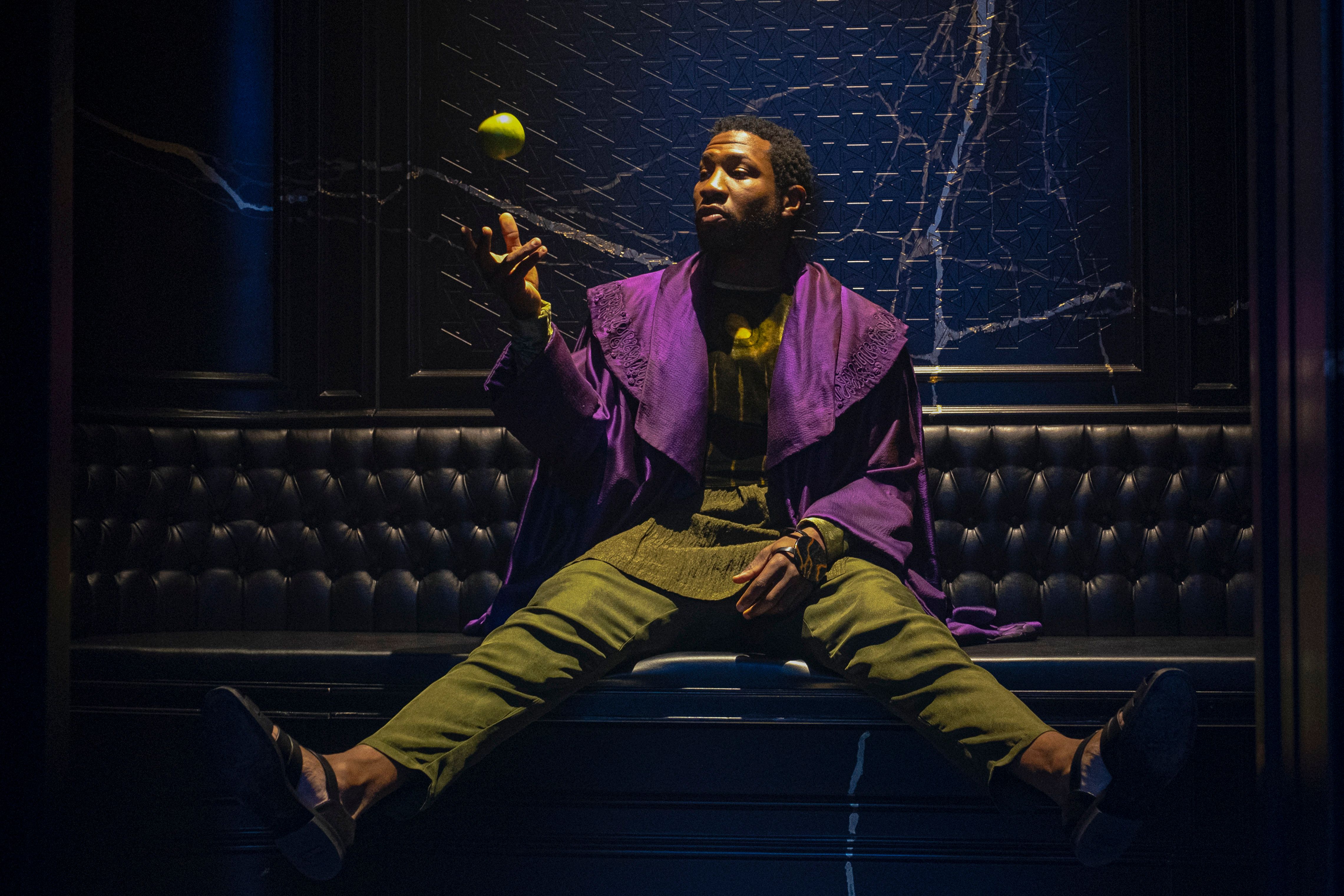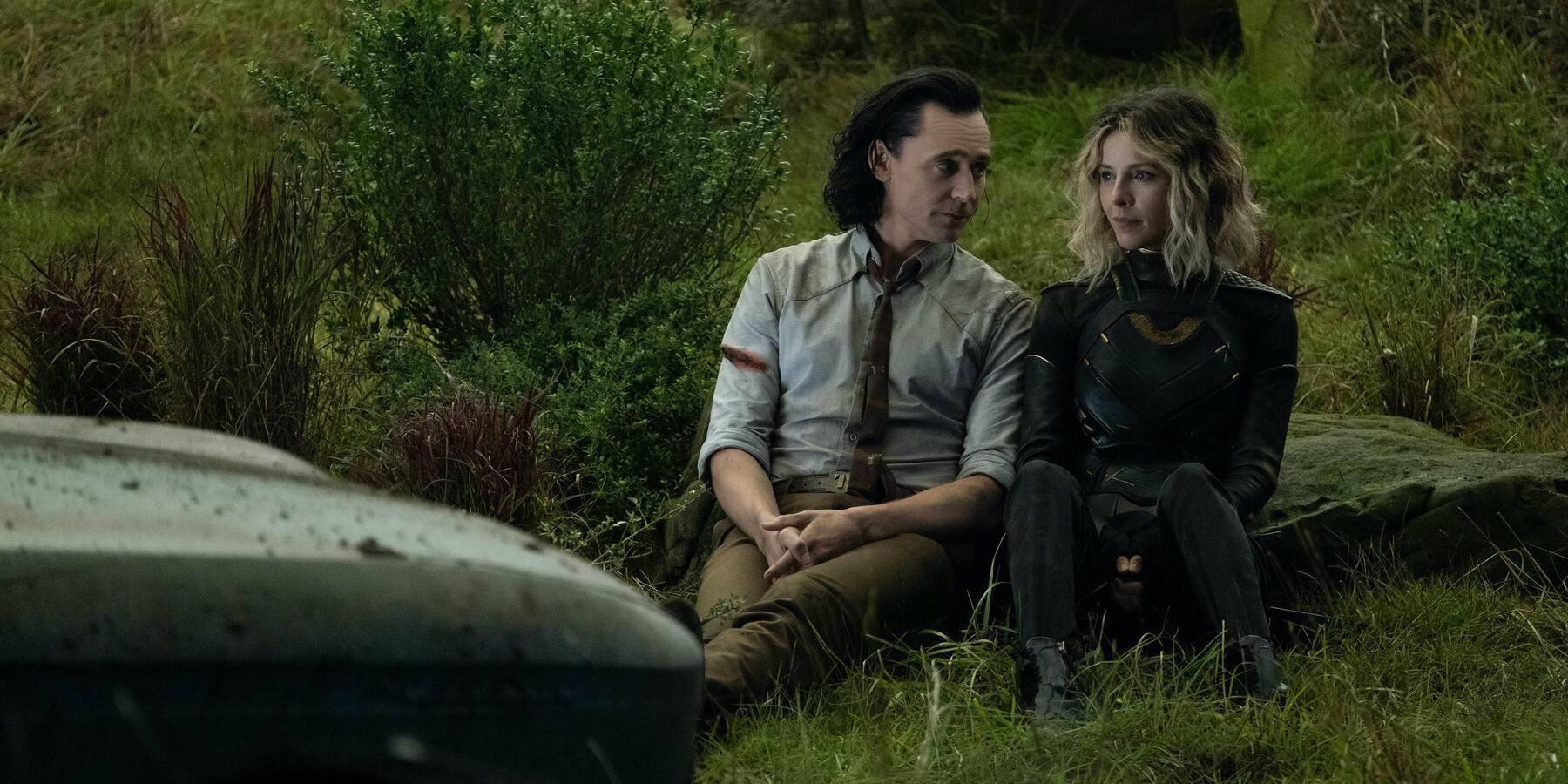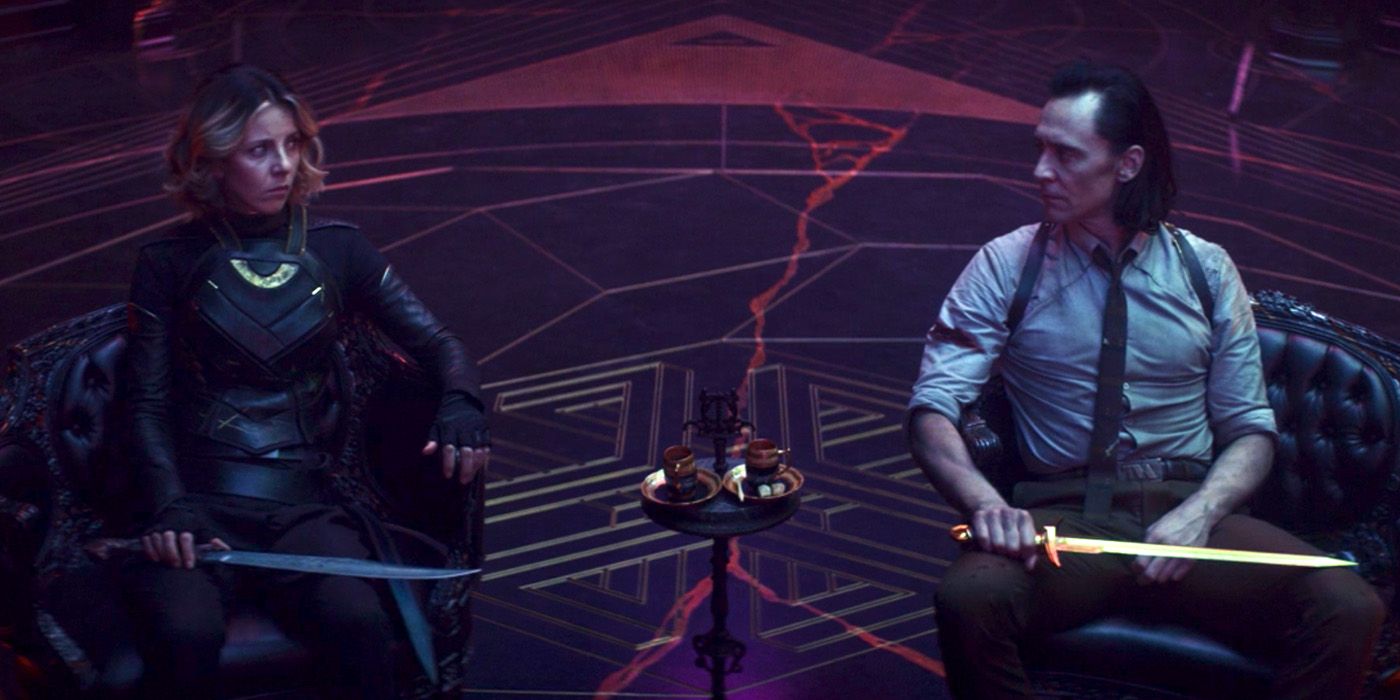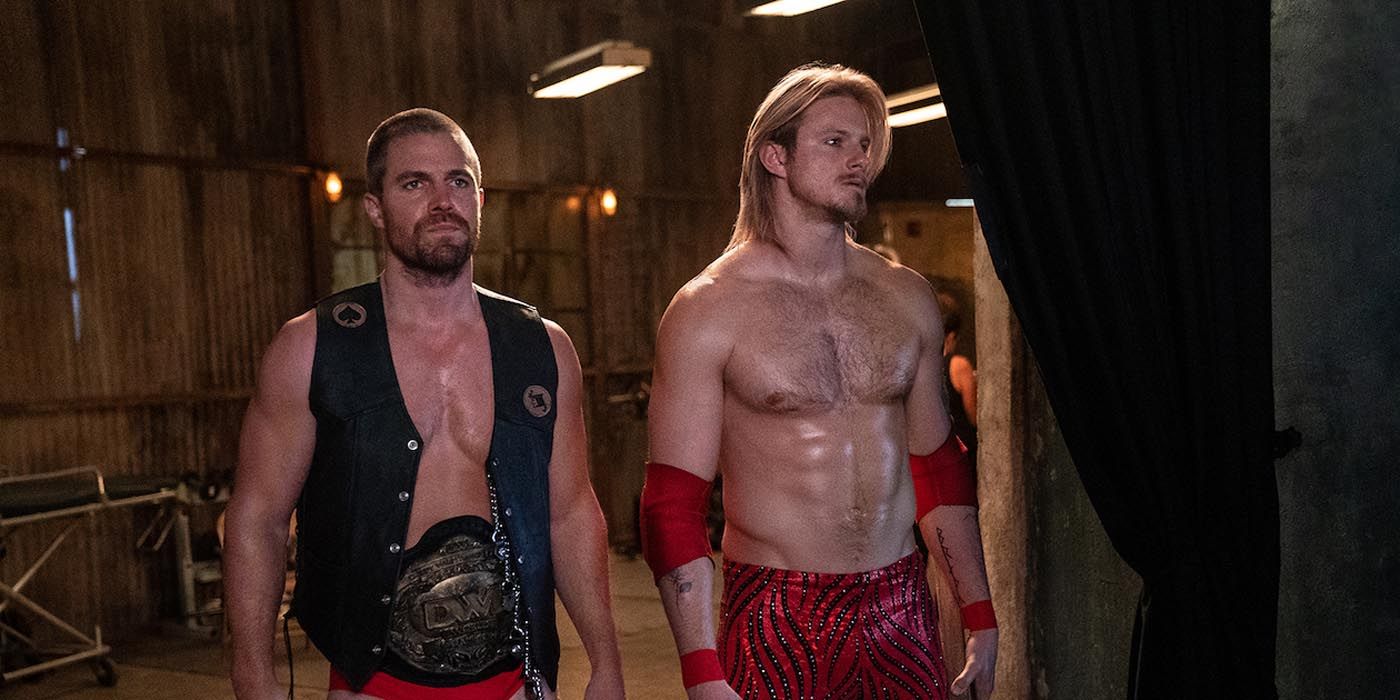Loki Season 1 went out with a Big Bang, unleashing the next phase of the Marvel Cinematic Universe in its creation of the multiverse. When the God of Mischief and Sylvie finally arrived at the Citadel at the End of Time, He Who Remains greeted them and revealed the method behind his madness. As it turned out, the Sacred Timeline and the Time Variance Authority were his machinations, created to prevent a multiverse where variants of himself could develop. However, Sylvie destroyed his work with a swing of her sword, paving the way for Kang the Conqueror to arrive -- and stranding Loki in a universe he couldn't even recognize.
Speaking to CBR, Loki head writer Michael Waldron discussed his approach to the finale, as well as his upcoming projects Doctor Strange in the Multiverse of Madness and Heels. He revealed he fought to introduce Kang from the series outset and explained what makes He Who Remains particularly dangerous. He compared Loki to Captain America at the end of Avengers: Infinity War and broke down how the finale gives Sylvie more room to evolve. He also shared his experience working with director Sam Raimi on the Doctor Strange sequel, how Heels taps into the creative process and more.
CBR: What was the fan reaction to the finale like for you? Was it what you expected, or did it take you by surprise?
Michael Waldron: It was a joy. Yeah, it was so great. There was so much enthusiasm and just engagement. That's the dream, that you're the show that people are talking about week by week. So, I just go to all the websites that I read normally, and suddenly, it's Loki on there. So it was a very "pinch yourself" six weeks. I felt very fortunate for how much people cared.
Jonathan Majors stole the show as He Who Remains. Tell me a little about working with him and what you feel he brought to the series as a whole.
God, I mean, we really got lucky to get that guy! [laughs] The entire finale hinges, in a lot of ways, on that performance, on delivering exposition and everything in a compelling, charismatic way. Not everybody is going to instantly know, "Oh, that's the guy who's playing Kang the Conqueror. So cool! That's a big bad!" You can't assume that most of your audience is immediately thrilled by that the way maybe a deep cut fan would be.
So we knew it was gonna have to be a hell of an actor and yeah, Jonathan was amazing. I was there. I was lucky to be there on set. I was coming back from London, working on Doctor Strange, and I was able to stop through in Atlanta for that last week and see Jonathan do his performance in person. It was just mesmerizing to watch these 20-minute takes on this incredible set. Everybody did such a cool job. It was great.
After that scene, I feel like I could watch him read the phone book.
Absolutely! And he's such a nice guy, too. He was just such a cool dude. Yeah, it was really fun.
At what point did you realize you were going to introduce a variant of Kang to the Marvel Cinematic Universe?
I was fighting for that from the beginning. That was what I wanted. I think the onus on us was to prove why that made sense. As our story came together, and as we realized this isn't just a time travel story, this is a multiverse story, and as we really built out what was going to be the mythology of the man behind the curtain, so to speak, it just made sense. Who is more dangerous, who would you want to contain the variants of, more than Kang the Conqueror?
There are two moments from the finale that I can't get out of my head, and one of them is the part where He Who Remains tells Loki and Sylvie, "We're all villains here." It's such a delicious line that tells you so much about the character. Why is it that he sees these two -- and himself -- this way?
I think that, like Loki at the top of the show, He Who Remains is self-aware enough to know that he's done terrible things, that pruning people and sending them to the Void to be devoured by Alioth is not -- he's not a hero for that, but that the ends justify the means. He believes, "Well, but this is for the greater good," just like Loki would have argued, "Well, but I would be such a good ruler; it would be better for people. I would have made it easy for them if they'd just let me rule." So I think he's a self-aware villain who understands, "Yeah, we do bad shit. Somebody's got to. The universe is lucky it has us, because we're willing to get our hands dirty."
The other moment comes at the very end, after Loki has lost Sylvie to her decision, when he ends up in a world and/or timeline where Mobius -- his only friend -- doesn't recognize him. Why was it important to leave him on that note?
I think that the the journey of this season for Loki -- at the top of the season, at the end of the first episode, he assesses himself to Mobius as a villain: "That's what I am." I think that you could argue that the journey of the season for him is about Loki becoming a hero in a lot of ways, and what's more heroic than doing the right thing for the right reasons and losing anyways? Suddenly, he's in the position that Steve Rogers found himself in after Infinity War, which is really compelling.
So Loki sits there, in the time theater, with all of that washing over him, and I think that's such a powerful moment when he decides to get up. He's changed now and he is a hero, and now he's going to go do what heroes do, which is, "Alright, there's a threat coming. We've got to deal with it." And then there's the rug pull of, "Oh, shit, I thought things were bad before. Things are just getting started."
Sylvie basically goes in the opposite direction. Was she always destined to be the villain, so to speak, of this piece? Tell me how you arrived at that particular decision.
We talked about this a lot in the writers room, that what would be really fun with Sylvie's character is to meet her and to quickly realize that she obstensively has a heroic goal, that taking down the TVA is a heroic thing, and over the course of the show and there at the very end, pull the little switcheroo that maybe it's not so heroic, that it's like she was doing it perhaps just for the wrong reason, that it was never necessarily about granting free will or doing the right thing, but maybe it really was just more about vengeance, because I just think she's not as evolved as Loki yet.
You know, she had the relationship with Loki. Loki had that relationship with her, but he also had that relationship with Mobius and that friendship that evolved him. I think that that was the fun thing with Sylvie, that in the end, she does maybe the wrong thing and you get that great sort of end of The Graduate moment with her just, "Now what?" She fulfilled her glorious purpose!
It's like Loki says in Episode 5: "Oh, maybe there'll be a reality I could rule; then I'd finally be happy," he says kind of sarcastically and I think that that Sylvie, maybe in that moment after she stabs him, realizing, "I did what I always wanted to do and didn't really change anything. I'm just alone."
This series, and particularly Episode 5, was absolutely jampacked with Easter eggs, from Throg to that statue of the Living Tribunal to the Thanoscopter. Is there one that nobody has caught yet?
Easter eggs. I mean, God, there's no -- maybe there's one. I think there's one that's still out there that nobody's found yet.
Can you offer a tease of what it might be? Do you have a favorite one?
No, I just want people to look. I just want to boost the numbers! [laughs] I want people watching! What is my favorite Easter egg? I mean, I love Throg. That's awesome. I think it's been said we actually shot a version of an expanded scene with Throg in Episode 1 that didn't make it in there, but I am glad that's in there in some form.
What was something that ended up on the cutting room floor, that you wished had made it into the final edit of Loki Season 1?
There is, and everybody who worked on the show knows exactly what I would say, but I don't want to say it because I'm keeping it up my sleeve. I'm going to keep trying to get it in other places.
Also, I couldn't help but notice the Void is full of lunch trays… Does the TVA just purge their lunch when they're done with it?
Yeah! I mean, look, they're an efficient organization. You know, it's ultimately a dumping ground. That's probably a question for Kate Herron more than me, that sort of stuff, but Alioth is ultimately a very efficient trash compactor. So I don't know why you'd send it anywhere else!
The finale opens up a world of possibilities and universes for the MCU to explore. What excites you the most about what you were able to set up here?
In the same way that Marvel once upon a time, that the MCU went to space, and that was exciting because we were going to meet new characters and go to new places I think that it's just, what new characters are we going to meet? And, I guess, specific to the multiverse, what new versions of other characters are we going to meet? I think that that's an exciting thing. Suddenly, it's not just one universe and the stakes of one universe that we're dealing with; it's the stakes of many, and that's fun.
In the promotional material and in one of the earlier episodes, Loki confirmed the character is gender fluid. What went into that decision, and how do you hope that impacts the MCU moving forward?
Well, that was a thing that was put out there and confirmed in that promotional material and yeah, I mean, that's just being true to who the character is in the comics canon and everything and acknowledging it there. Then in the series, when Loki and Sylvie are talking, he acknowledges that he's bisexual, a bit of both and everything. So it was important to acknowledge those things.
Ultimately, this particular story is not a story necessarily about those things. I hope that doesn't, and it was never intended to, diminish those aspects of the character at all. Those are very important pillars of who Loki is, and I think that's why that stuff is in there.
What do you hope viewers will take away from Season 1?
That anybody can change and you can be whoever you want to be, just in case anybody ever told you different. You know, what Mobius said to Loki right in Episode 4. I hope that that was the most potent message of our show.
Obviously, you are a busy man, but what are the odds we'll see you return in some capacity for Loki Season 2?
Time will tell. Time will tell.
You're not out of the MCU woods just yet, with Doctor Strange and the Multiverse of Madness coming up early next year. How did your writing approach change between Loki and Doctor Strange 2?
Not really much at all. Obviously, Loki is a TV show, so you have more time -- you can write a 14-page dialogue scene -- whereas Doctor Strange is a feature and so there's an accelerated pace and everything. So that's probably the biggest thing, is just pacing. You've got to move faster. But it was great! I got to work with Sam Raimi. That was a blast.
Raimi is basically a film legend at this point. What was it like to work so closely with him on this film?
Yeah, I mean, gee, I would say most most days of 2020, I was on a Zoom with Sam Raimi working on this movie. Then I was in London for the entire shoot, there with Sam, just trying to help him execute his vision on this thing. Yeah, he's a master. It was awesome.
Several people involved with the movie, including Elizabeth Olsen, have described the film as being Marvel's scariest film yet. Tell me a little about the decision to lean into the horror of Doctor Strange in the Multiverse of Madness.
Well, I think that obviously Sam's resume speaks for itself. The movies he's made all have that thrilling horror quality to them. Doctor Strange is a character who deals in the occult and in things that are naturally kind of scary and mysterious. [laughs] So it was just a natural fit to maybe push the envelope a little bit with that stuff.
You'll also be working with Kevin Feige on his upcoming Star Wars project. What excites you the most about getting a chance to play in this sandbox?
Star Wars! It's the best! I love it. Star Wars is awesome. Yeah, it's just cool. [laughs] That's not gonna be a very good quote! But Star Wars is cool.
Going by your past credits, Heels feels like a bit of a departure for you. Take me to the beginning of this project and tell me a little about how that got started.
I wrote this pilot in 2013 when I was an intern on the first season of Rick and Morty. It was the first purely dramatic piece I had written. I love wrestling; I'm a huge wrestling fan. I was from the time I was a little kid. I just realized that my favorite shows were one-hour dramas, and I was like, "Well, is there a way to fuse those two entrails?"
It's cool, because it's a show -- ultimately, we think of wrestlers as great athletes, which they are, but they're also artists. They're creatives and storytellers in the ring, telling stories with their matches and the overall narratives that build up to these matches. So writing a show almost about the creative process, it was fun, and it felt rich and about the same things that I like to deal with, which is identity and who you are and can you change who you are?
What element of wrestling were you most excited to bring in and use in Heels?
Besides all the deep cut stuff, which you have to kind of be careful with because you don't want to alienate the audience, but just the knowledge, again, of the artistry of this stuff. There's a ton of stories about the dark side of wrestling, and that exists and our show absolutely acknowledges that, but we wanted to celebrate the beauty of it a little bit and the artistry of it. That's the thing that I've come to appreciate, just being a fan.
What made Stephen Amell the right person to lead this series?
I mean, Stephen's amazing. He's a huge wrestling fan in his own right. He's wrestled with the WWE. He's actually been in the ring, done it for real. So there's not a better guy out there to come in and carry this show. Yeah, he loves the world of wrestling and he's reverent of it. He's just a hell of an actor and it's great to get to watch him do something that really showcases his physicality but also just as dramatic chops. You know, everybody who loves him from Arrow is going to be blown away by this.
What about this series do you think will surprise viewers the most?
What I hope surprises people is the heart of it, that amid all the family drama and the darkness and everything, that there is a little bit of that Friday Night Lights aspirational magic sprinkled here and there. At least I hope so!
Loki Season 1 is now streaming on Disney+ in its entirety. Heels is set to premiere Aug. 15 on Starz.

